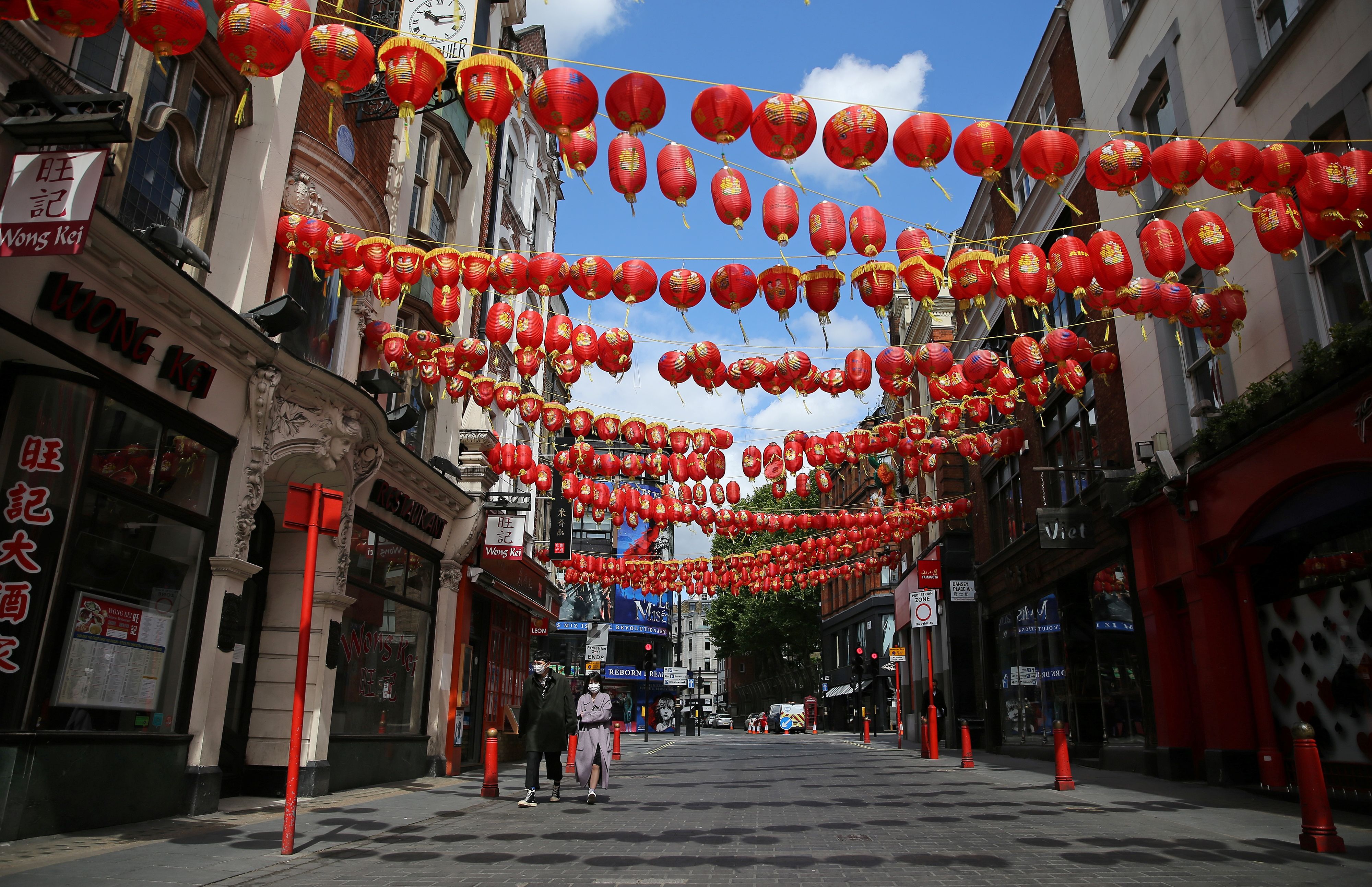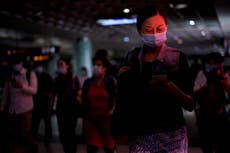How British east and southeast Asians are fighting racism during the pandemic
As the number of attacks against east and southeast Asians soars during the pandemic, Kate Ng speaks to some of the victims and explores the lesser known impacts on the communities


Your support helps us to tell the story
From reproductive rights to climate change to Big Tech, The Independent is on the ground when the story is developing. Whether it's investigating the financials of Elon Musk's pro-Trump PAC or producing our latest documentary, 'The A Word', which shines a light on the American women fighting for reproductive rights, we know how important it is to parse out the facts from the messaging.
At such a critical moment in US history, we need reporters on the ground. Your donation allows us to keep sending journalists to speak to both sides of the story.
The Independent is trusted by Americans across the entire political spectrum. And unlike many other quality news outlets, we choose not to lock Americans out of our reporting and analysis with paywalls. We believe quality journalism should be available to everyone, paid for by those who can afford it.
Your support makes all the difference.Coronavirus made 2020 a difficult year for everyone across the UK, with thousands losing their jobs and loneliness sweeping the nation. But for people of east and southeast Asian (ESEA) descent, it has stirred up the “raging horror” of racism, on top of everything else.
ESEA communities have faced soaring racially-aggravated violence and discrimination during the course of the pandemic, as the virus was inextricably linked to China.
Racist hate crime against people described by the Metropolitan Police as Oriental soared. Between January and June, Met Police recorded a total of 457 race-related crimes against people of “Oriental” ethnicity or who self-defined as Chinese.
In February alone, police data revealed that 64 incidents of racist hate crimes against “Oriental” victims were recorded, more than twice the number in the previous year (29). In March, this rose to 101, nearly three times as more than in March 2019 and 2018.
“An undercurrent of anti-Asian racism has plagued this country well before the pandemic started, but now the lid has been lifted and the far-right have wrongly been given legitimacy to air their derision, violence and hatred,” Labour MP Sarah Owen, who is half Malaysian Chinese, told MPs in October.
The pandemic also blew the lid off a particular phenomenon for ESEA communities – the myth of the “model minority”. The phrase refers to minority demographics that are perceived to have achieved a higher degree of socioeconomic success compared to the population average.
This success is largely measured by how well these communities do in terms of education and household income, as well as other indicators such as low criminality.
Many older generations of the ESEA diaspora living in western countries have leaned into the model minority stereotype, believing if they assimilate, stay quiet and work hard, no harm would befall them.
However, the arrival of Covid-19 pried open a can of worms with such force that it has left the communities reeling, forced to face racial discrimination against anyone who is Chinese or looks Chinese in the UK, US and Europe.
The racialised sentiment was further compounded after US President Donald Trump posted his first of many tweets using the racially-charged term Chinese Virus on his Twitter account on 17 March – placing the blame for the pandemic squarely on the shoulders of the Chinese population.
That same month, a Singaporean-Chinese student was beaten while walking down Oxford Street by a group of men who told him: “I don’t want your coronavirus in my country.”
Later, a teenage boy spat in the face of the owner of a Chinese takeaway in Hertfordshire, demanding to know if he had coronavirus in an incident police treated as racially aggravated.
Covid-related racism has been felt by the communities in a number of different ways. Chinatown in London saw business fall almost immediately after the virus was linked to a food market in Wuhan, and a number of long-standing restaurants there have closed permanently.
Evelyn Lee, a Taiwanese national living in London, said her noodle kit business, Kung-Fu Mama, experienced a sharp drop in sales, particularly in southern parts of the US, throughout the pandemic.
“I think linking the global pandemic to Wuhan in China has led to discrimination and severe political problems, and the result is that a lot of Asian people are now afraid of Westerners,” she told The Independent, and said that she wished people would understand the differences between people of Asian heritage.
“I hope people will pay more attention to the differences between us. I’m from Taiwan, not China, and the Taiwanese government has done a great job of handling the virus. I hope people can pay attention to that, focus on the success of other countries and learn from them.”
Being out and about in society as someone with Asian heritage has become a more frightening experience, said activist Bonny Turner, who is half Japanese. She told The Independent she did not wear a face mask that carried Japanese kanji characters on it, which was given to her by a friend from Kyoto, because: “It screams out that I’m Asian.”
“My eyes are already Asian,” she said. “The mask is quite lovely, it doesn’t even say anything specific, it’s just the brand name. But to the average person, they’re not going to know what it is – it screams out that I’m Asian, possibly even Chinese.”
Actor and Moongate Productions co-founder Daniel York Loh said he believed the community’s experience of the past year was the manifestation of a low-lying prejudice.
The mask is quite lovely … but to the average person, they’re not going to know what it is - it screams out that I’m Asian
“In Britain we get sucked into the idea of being a model minority so much so that we think we’re not really an ethnic minority and we’re not really discriminated against, but it’s there,” he told The Independent.
“It’s manifested into this raging horror, literally to a point where it isn’t safe for people of ESEA heritage. I know of girls who have been punched, people attacked in the streets… it was always there.”
Mr Loh spoke of an experience where he and his wife were walking down a street and a group of children nearby told each other: “They’re Chinese, you need to put your mask on.”
“It upset me so much that they were a family of Muslims, a group that has experienced so much violence and discrimination, and they were perpetuating this idea. The parents looked embarrassed but didn’t say anything.”
But there is hope. Young ESEA people have recognised the need for their own platforms to fight against racial discrimination and create space for themselves, Mr Loh said.
Moongate Productions – which creates theatre, films and documentaries – responded to the rise in hate crimes with “WeRNotVirus”, a series that commissioned British ESEA writers to tell their stories.
Elsewhere, six east and southeast Asian women created Britain’s east and southeast Asian Network (besea.n), a grassroots movement that aims to tackle negative stereotypes and promote positive media representation of the community in the UK.
At a local level in London, mental health charity Meridian Wellbeing partnered with the Chinese Association of Tower Hamlets to launch a project that deals with anti-Chinese hate crimes and provides support for vulnerable people.
Ms Owen, who is also the chair of Chinese for Labour, brought up the issue of Covid-related racism in parliament earlier this year and continues to urge ESEA communities to report hate crimes and seek support from the various movements.
“One of the best things that has happened during coronavirus is that in response to the rising racism has been the response I’ve seen from our community in being willing to work with east Asians and southeast Asians,” she said.
“It’s not been us in our own ethnic groups, we’ve reached out – for example, the End the Virus of Racism launch, as well as second and third generation British east Asians coming forward and using their voice.
“I’ve been working with them and managed to get a meeting with Department for Digital, Culture, Media and Sport (DCMS) minister Caroline Dinenage to talk about why is it we are suddenly seeing pictures of our faces being used all over the media when you couldn’t see us anywhere in mainstream media before.
“She completely took that on board and it was really positive to see. She brought someone from the Cabinet Office, from Health and DCMS because it reached across. We’re waiting and continuing conversations there.”
She told The Independent that while campaigning a number of years ago, she met a man on his doorstep who told her he didn’t like immigration and listed off the ethnicities he didn’t approve of.
Then he paused, and said: “But I don’t mind the Chinese. They’re hardworking and obedient.”
Ms Owens, who has Malaysian Chinese heritage but whose appearance can often be mistaken for white-passing, said: “Well, I guess I’m just hardworking then.”
Without looking embarrassed, the man leaned forward to look closer at her face. Then he leaned back and declared: “Yeah, you don’t have entirely round eyes.”
“We’re at a base level when it comes to discussing racism against ESEA people, really base, and that goes for coronavirus as well as in our general culture and media,” she said.
“I am not a model minority. I am not obedient, or quiet – but I am hardworking. If there is anything positive to be seen out of Covid-related racism, it is that it has brought a group of ESEA people together in a way they wouldn’t have been before. Combining their forces is the way forward, and we’re not stopping, we’re not slowing down, we’re not going away.”




Join our commenting forum
Join thought-provoking conversations, follow other Independent readers and see their replies
Comments